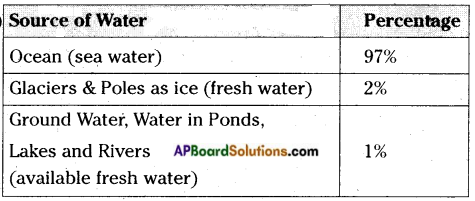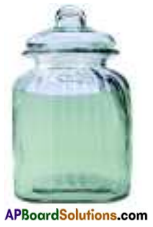AP State Syllabus AP Board 7th Class Science Important Questions Chapter 14 Water – Too Little To Waste
AP State Syllabus 7th Class Science Important Questions 14th Lesson Water – Too Little To Waste
7th Class Science 14th Lesson Water – Too Little To Waste Important Questions and Answers
Question 1.
How is water distributed on the globe? How much of freshwater is available to us?
Answer:
- If the total water on earth be 100%, the percent fresh water available to us is only 1%.

![]()
Question 2.
When was the international decade for action on ‘water for life’ declared?
Answer:
- On World Water Day, that is 22 March 2005, the period 2005 – 2015 was declared as the International Decade for action on “Water for Life”.
Question 3.
What would you do for the cause ‘water for life”?
Answer:
- Normally a lot of water flows out of the kitchen as well as bathrooms in our houses.
- Many of us do not know that water is being wasted in this way.
- We must make a channel of water to flow from kitchen to the garden around.
- We cannot wastewater from the bathroom also. It could be used after purification.
Question 4.
Why do we need proper drainage system?
Answer:
- We dispose of wastewater in our daily life in different ways and means.
- We often see water stagnated near bore wells or beside houses.
- Sometimes human and animal excretions also mix with this water.
- We get a foul smell when we walk near those areas.
- To prevent this we need a proper drainage system.
Question 5.
How do you find out what realty happens to waste water at treatment plants?
Answer:
- Fill a large glass jar 3/4 full of water. Add some dirty organic matter such as grass pieces or orange peels, a small amount of detergent, and a few drops of an ink or any colour.
- Cap the jar, shake it well and let the mixture stand in the sun for two days.
- After two days, shake the mixture and pour a small sample into test tube. Label this test tube “Before treatment; Sample 1”. How does it smell?
- Use an aerator from an aquarium to bubble air through the sample in the glass jar. Allow several hours for aeration; leave the aerator attached overnight. If you do not have an aerator, use a mechanical stirrer or a mixer. You may have to stir it several times. This actually works like a skimmer of the wastewater treatment plant.
- Aeration causes organisms that break down waste to grow faster thus it leads to what is called as “Biological Process”.

- The next day when aeration is complete, pour another sample into a second test tube. Label it “After aeration; Sample 2”.
- Fold a piece of filter paper to form a cone. Wet the paper with tap water and then insert the cone in a funnel. Mount the funnel on a support.
- Place layers of sand, fine gravel and finally medium gravel in the funnel.
- Pour the remaining aerated liquid through the filter into the beakers. Do not allow the liquid to spill over the filter. If the filtered liquid is not clear, filter it a few times till you get clear water. This is “physical process”.
- Pour a sample of the filtered water into a third test tube labeled “Filtered’ Sample 3”.
- Pour another sample of the filtered water into a fourth test tube. Add a small piece of a chlorine tablet. Mix well until the water is clear. Labe! the test tube “Chlorinated; Sample 4”.
- This is a “Chemical Process” of treatment.
- Observe carefully the samples in all the test tubes. Do not taste! Just smell them!
- We can easily under stand how the wastewater is recycled in the treatment plant.
![]()
Question 6.
For which purposes are we using freshwater?
Answer: Freshwater has been the constant and essential companion of human beings throughout history. Water is used in great quantities in agriculture and industries.
Question 7.
How is freshwater distributed over the globe?
Answer:
- Our globe is poorly endowed with fresh water.
- Most water is rendered useless to humans by dilution with salt in the oceans.
- Only 2.5 percent is available as freshwater of which 2/3 is locked up in Ice and snow.
- Nature is unkind in depositing almost eighty percent of rain over the sea.
- The rain that falls over the land has a great potential value.
Question 8.
What is causing water scarcity? Write the principle ways which are degrading the quality and quantity of natural supply of fresh water.
Answer:
- Unsustainable extraction of fresh water causes water scarcity.
- Due to the over-extraction of fresh water underground reserves are falling rapidly.
- In India, the water table has fallen more than 300 meters’.
- Human interventions which degrade the quality and quantity of the natural supply of fresh water occur, in 3 principal ways.
- Firstly dams alter the natural flow of rivers often leading to water scarcity.
- Secondly, soil moisture is lost by land degradation due to poor farming practices
and deforestation. - Thirdly, surface water is polluted by run-off chemicals used in industries and households.
Question 9.
How can you say that the next cold war could be over water?
Answer:
- The world population is projected to grown 9.3 Billion by 2050.
- In addition to safe drinking water and sanitation, the rising pressure on freshwater will be felt most severely in the energy and food sectors.
- Two out of three people will be living with water shortage by 2025.
- The growth of demand the decline in freshwater availability, the adverse health effects from poor water quality and scarcity will result in violence and water wars.
- The next cold war could be over water.
![]()
Question 10.
How can we conserve water? Write some practices that can be adopted.
Answer:
a)
- We perform many activities in our daily life using water.
- We can conserve water by adopting certain good practices,
b) Some practices that can be adopted:
- Water is precious. We should not waste it.
- Collect water in a bucket after cleaning rice, dal and vegetables in the kitchen which contains peels of vegetables.
- We can use this water for our cattle.
- We should not throw solid food remains, tea leaves and oily wastes down the drain.
- We must make a channel so that the kitchen and bathroom water flows to the coconut and banana plants in our garden.
- We should use only mild soaps and detergents so that this water may not harm our plants.
- Any leakage of water from any tap must be repaired immediately.